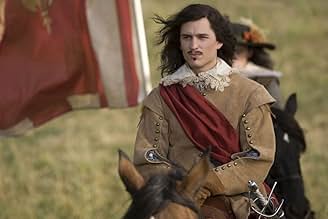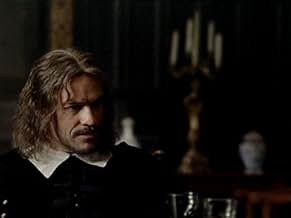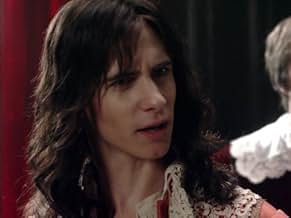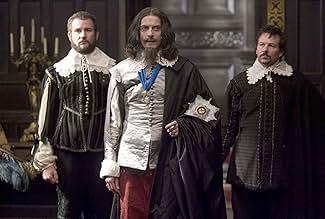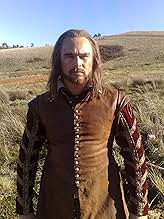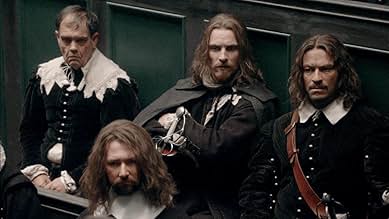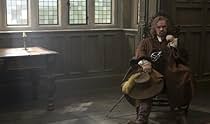The Devil's Whore
- Miniserie de TV
- 2008
- 47min
CALIFICACIÓN DE IMDb
7.0/10
2.8 k
TU CALIFICACIÓN
Sigue el desarrollo de la Guerra Civil inglesa a través de la historia de una joven, la ficticia Angelica Fanshawe, y sus tres maridos.Sigue el desarrollo de la Guerra Civil inglesa a través de la historia de una joven, la ficticia Angelica Fanshawe, y sus tres maridos.Sigue el desarrollo de la Guerra Civil inglesa a través de la historia de una joven, la ficticia Angelica Fanshawe, y sus tres maridos.
- Ganó 1 premio BAFTA
- 8 premios ganados y 7 nominaciones en total
Explorar episodios
Opiniones destacadas
Well, The Devil's Whore gets two cheers for trying – OK, make that two and a half - and if in some ways it failed, I don't think it should get all the blame. It seems that what was conceived of a 12-part series hit the financial buffers of necessity became a four-part series and, unfortunately, in many ways it shows. What finally hit the screens over four one-hour episodes is by no means bad and is most certainly very entertaining, but it is something of a mongrel, a hotch-potch of this, that and t'other. The background - well, more than the background - the whole context to what purports to be a true account of a fictional character is a period in British history which is not only fascinating but which led to the foundation of democracy throughout the world. But it was anything but straightforward: it wasn't simply a question of 'the people' rising up against 'the king' as many believe, but an intricate and complex realignment of authority and power. It began in the reign of Charles I and more or less concluded when his son, Charles II, was restored to the throne and England and Scotland once again had a monarchy. But it was a very different monarchy which now existed and over the next 150 led to the creation of parliament which Brtitain likes to boast was the template of all other parliaments. (It wasn't really, but that is here not the issue). But for a very nasty period of 20 years, Britain was convulsed by strife and civil war in which many died and which saw a great deal of death and brutality. In the Levellers, the country experienced what would later be known as communism but it also saw how privilege and property is so engrained in the fabric of this and all other countries that it takes more than ideals and violence to dislodge them. That is the background, and a 12-part series from the same team which produce this cutdown lite version might well have made a good fist of explaining the complexities of that time. In the event they don't, and what we do get at the historical and political level is akin to a primary school textbook account. The Devil's Whore is also something of a bodice-ripper, and here it perhaps scores a little more. And I suspect that element, the romance and dashing hero stuff would have found a way of fitting in quite nicely with an intelligent exposition of the English Civil War and its aftermath. The problem is that those who see The Devil's Whore might well remember that as their 'history', but it does take enormous liberties with the truth in the interests of creating rattling entertainment. Thus Thomas Rainsborough, Edward Sexby, John Lilburne and, of course, Oliver Cromwell were all historical characters, but in this version they are fictionalised to such an extent that often only their names remain what is true about them. There is also the quibble, a pretty universal fault, of coincidence: blow me do the various characters appear in just the right spot at just the right time. Right on cue. And they manage to travel some distances with no bother at all. Then there's the curious matter of the Devil, who appears, usually sitting on a tree, at the strangest moments. I assume he is the Devil for whom the heroine Angelica Fanshawe is the 'whore', but that must remained supposition as no explanation for his continued appearance is even attempted. And what about Prince Rupert, bosom pal of Angelica's first husband who even turns up in the wedding chamber on her wedding night, but then suddenly disappears from view never to be heard, seen or spoken of again. Odd. That, too, was probably a victim of the cuts from a 12-parter to a third that length. No doubt such anomalies might have been ironed out had the money been there and the series been a 12-parter after all. As it is we have to put up with outrageous suspension of disbelief. Overall, of course, and sitting side by side with other TV drama, The Devil's Whore isn't half bad and most certainly very entertaining. The pity is that for want of a penny or two more it might well have been outstanding. But that it isn't.
I have little knowledge of the historical period on which this is based but it gave a pretty good idea of the socio political situation. All the actors were excellent and Michael Fassbender as Thomas Rainsborough was exceptional.
Peter Flannery wrote one of the finest dramatic accounts of recent history, the epic television series 'Our Friends in the North', but sadly, his attempt to write about the English Civil War is a far inferior affair. To me, the essence of good historical drama is that it distances us from our own times, and allows us to see how others could have held positions that seem to us indefensible; but 'The Devil's Whore' invents a fictitious female heroine, beautiful and anachronistically feisty (and involved in a story line that could have been borrowed from 'Thelma and Lousie'!) who seems to exist for the sole purpose of allowing us to judge the past through a modern pair of eyes. The writer also clearly wanted a share of the market for posh-frock romances, and the possibility of a happy end, while also putting this unlikely figure on the "right" side of the conflict - hence, wholly implausibly, our heroine is rendered as an aristocratic Leveller. The drama's general sympathy for the Levellers (and associated proto-socialist movements) is also overdone, in that the characters with attractive politics are consistently shows to be morally superior, and more likable, than those without. Against, the contrast with 'Our Friends', whose general sympathies for the Labour cause did not reduce the story to a black and white tale, is clear. The only really interesting character in this story is the Charles I, knowledge of whose execution perhaps invokes a certain involuntary sympathy on the part of the viewer, and who is suavely played by Peter Capaldi. But overall, 'The Devils Whore' is part Hollywood narrative , part Jane Austen and a sprinkling of socialism: an odd combination, and a disappointment compared with Flannery's best.
I can't believe that I know so little about the English Civil War and this series has stimulated me to learn more. The characters were portrayed so well that I feel I want to know so much more about those who were real people. John Simm's performance as Edward Sexby haunts me because he spent so much time longing for a relationship with Angelica, then finally reached his goal, only to move away from her again towards another greater goal. It was inspiring, and I was captivated by the visual impact and the political power of the plot. Like the West Wing, the Devil's Whore managed to make me interested in political issues that may seem dull elsewhere. Oliver Cromwell came across as a real man and most of the real historical figures were 3-dimensional. Angelica was fascinating and powerful, and it doesn't matter that she was not real historically - she held the story together. The details of the struggle between the monarch and the parliamentarians is very gripping and is at the roots of our present system of democracy - probably the model for all democracies.
As a Quaker, I need to know as much as possible about this period in English history, because out of the many religious and political groups which grew up in the turbulence of the 17th century, the Society of Friends is one that has survived adapted to modern life - something that the Ranters and Levellers were unable to do.
Overall, my main impression was one of fascination with the story of Angelica's life and Sexby's devotion to her - it was a great inspiring tale. Such a shame that it had to be cut down from 12 episodes to 4 - how much more would we have gained if we could have seen all that was planned?
As a Quaker, I need to know as much as possible about this period in English history, because out of the many religious and political groups which grew up in the turbulence of the 17th century, the Society of Friends is one that has survived adapted to modern life - something that the Ranters and Levellers were unable to do.
Overall, my main impression was one of fascination with the story of Angelica's life and Sexby's devotion to her - it was a great inspiring tale. Such a shame that it had to be cut down from 12 episodes to 4 - how much more would we have gained if we could have seen all that was planned?
Excellently entertaining series with some interesting slants on the history but I appreciate that the writers did not set out to create a drama-documentary. Although they did incorporate some historical accuracy, anyone not knowing the real history of the Civil War could/would be very confused by some of the content. The real Thomas Rainsborough did not marry someone called Angelica Fanshawe and he is buried in the now disappeared graveyard of St John's, Wapping.
Pity that IMD have posted a picture of John Simm/Sexby's stand-in rather than JS/Sexby himself!!!!!
I am also totally stunned that the makers of the series insisted that they could not find suitable filming locations in the UK. I could have suggested any number of suitable locations both privately owned (but the owners have allowed filming) and NT or English Heritage. It seems amazing that with so much Tudor and Jacobean property here, not to mention forests etc that they deemed it necessary to ship cast and crew several thousand miles away to South Africa.
Pity that IMD have posted a picture of John Simm/Sexby's stand-in rather than JS/Sexby himself!!!!!
I am also totally stunned that the makers of the series insisted that they could not find suitable filming locations in the UK. I could have suggested any number of suitable locations both privately owned (but the owners have allowed filming) and NT or English Heritage. It seems amazing that with so much Tudor and Jacobean property here, not to mention forests etc that they deemed it necessary to ship cast and crew several thousand miles away to South Africa.
¿Sabías que…?
- TriviaMark Gatiss had a interview for the role of John Thurloe.
- ConexionesVersion of Nuevos mundos (2014)
Selecciones populares
Inicia sesión para calificar y agrega a la lista de videos para obtener recomendaciones personalizadas
- How many seasons does The Devil's Mistress have?Con tecnología de Alexa
Detalles
- Fecha de lanzamiento
- Países de origen
- Sitio oficial
- Idioma
- También se conoce como
- The Devil's Mistress
- Locaciones de filmación
- Productoras
- Ver más créditos de la compañía en IMDbPro
Contribuir a esta página
Sugiere una edición o agrega el contenido que falta

Principales brechas de datos
What is the French language plot outline for The Devil's Whore (2008)?
Responda
